Jeff Sessions’ daughter pens tribute in Facebook post
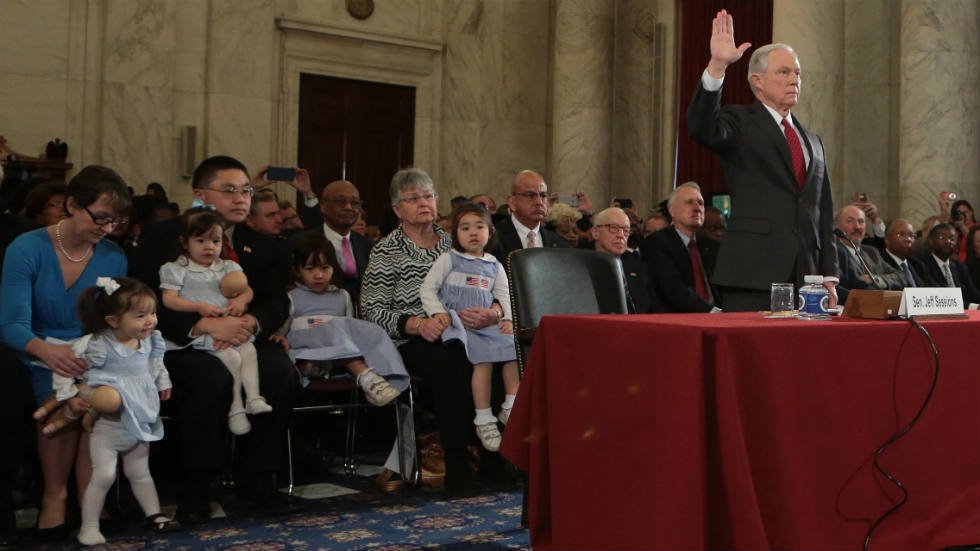
Often, politics in America looks pretty ugly. From the partisan bickering to media manipulation to the constant jockeying for power and position — it’s no wonder why Congress only has a 28-percent approval rating. But every now and then, something happens in the political world that humanizes politicians. Reminding us all that behind the fancy titles and lapel pins, there are men and women just like the rest of us — with families who love and support them through thick and thin. Such was the case on Thursday when Ruth Sessions Walk, daughter of the new U.S. Attorney General Jeff Sessions, took to Facebook to post a touching tribute to her father and thank his supporters after his swearing-in. The Alabama Republican underwent a particularly tough confirmation process in the Senate, with many of his Democratic colleagues calling into question not only whether he’d break from President Donald Trump when necessary, but also his character and integrity. “They were relentless and ruthless, and Dad complained not,” Walk wrote in her post. “They spewed lies and hate, and Dad simply shrugged it off. They chose to attack him when he was not there to set the record straight. Yet, still, in his last chance to dish it right back at them, my Daddy simply wished his colleagues well and asked them to find hope (and progress) through reconciliation with those of the opposite view point.” Walk went on to say those who are unconvinced Sessions is the right choice for AG, should “listen to those who actually know him and who have actually worked with him. The list of eye witnesses to his character is long. He may disagree with you in policy, but those disagreements do not make either of you evil. They just make you different.” Read her full post below: I am so honored to be my father’s daughter. His accomplishments and job titles aside, I am just so proud of his extreme graciousness towards those that intended him harm. They were relentless and ruthless, and Dad complained not. They spewed lies and hate, and Dad simply shrugged it off. They chose to attack him when he was not there to set the record straight. Yet, still, in his last chance to dish it right back at them, my Daddy simply wished his colleagues well and asked them to find hope (and progress) through reconciliation with those of the opposite view point. I obviously still have a lot to learn from my Dad. ? Friends, y’all have been AMAZING friends. The messages of encouragement always made my heart sparkle. The quick texts that said ‘don’t worry, I don’t believe the lies they spread’, reminded me that there is such a thing as truth. And your prayers for my family availed much. Thank you, friends, for being good friends. Thank you for spreading the truth to combat the slander. Thank you for engaging your own friends in discussions and debates over my Daddy’s character (as you have experienced it). I know such discussions have not been easy; they made me proud to call you a friend. For those of you who disagree with my Dad politically, thank you for finding the courage and self-control to refrain from spreading “the news” about him, simply because I might see it in my newsfeed. I understand how difficult such restraint must have been in such a politically passionate time, and I appreciate so much the extra care you took just because we are friends. For those of you still not convinced that my Daddy is the right choice for AG, please listen to those who actually know him and who have actually worked with him. The list of eye witnesses to his character is long. He may disagree with you in policy, but those disagreements do not make either of you evil. They just make you different. One thing is for certain, the Sessions family has felt the love from those who know us best. And that has made all the difference. Thanks for being our friends. Today was a great day. ??❤
Appeals court rules unanimously against Donald Trump travel ban

A U.S. federal appeals court on Thursday afternoon unanimously upheld a temporary suspension of President Donald Trump‘s executive order restricting travel from seven countries, dealing a major legal setback to the new administration’s immigration policy. The panel of three judges from the San Francisco-based 9th U.S. Circuit Court of Appeals declined to block the lower-court ruling that suspended the ban, allowing previously barred travelers to enter the United States. “We hold that the Government has not shown a likelihood of success on the merits of its appeal, nor has it shown that failure to enter a stay would cause irreparable injury, and we therefore deny its emergency motion for a stay,” read Judge Michelle Friedland, Judge William Canby Jr, and Judge Richard Clifton’s 29-page ruling. Trump’s controversial, Jan. 27 executive order barred entry for citizens from seven countries — Iran, Iraq, Libya, Somalia, Sudan, Syria and Yemen — for 90 days and imposed a 120-day halt on all refugees, except refugees from Syria who are barred indefinitely. Trump has since Tweeted a defiant response to the ruling, “SEE YOU IN COURT, THE SECURITY OF OUR NATION IS AT STAKE!” A White House appeal to the U.S. Supreme Court is possible.
Alabama AG Luther Strange sworn in to replace Jeff Sessions
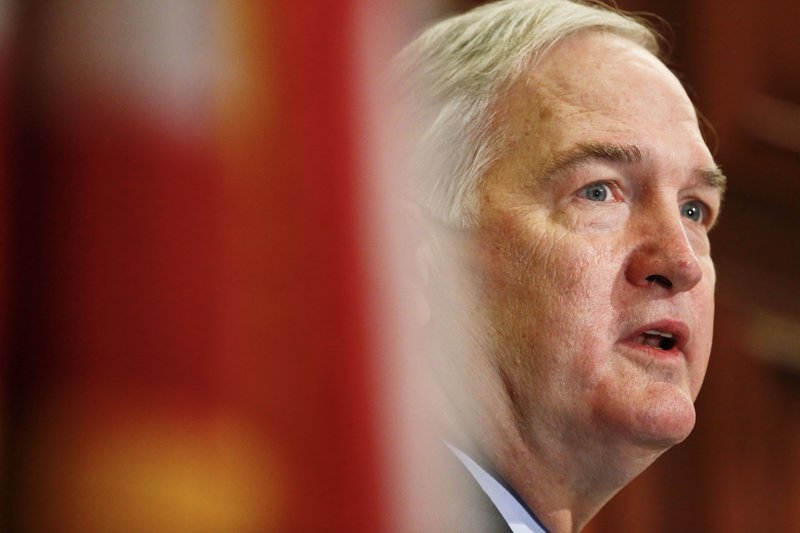
Republican Luther Strange, Alabama’s attorney general, was sworn in on Thursday to fill the Senate seat left empty by Jeff Sessions, tapped by President Donald Trump to be the nation’s top law enforcement officer. Sen. Orrin Hatch, R-Utah, administered the oath to Strange, a well-connected Republican and former Washington lobbyist. Attorney General Sessions and Sen. Richard Shelby of Alabama were at Strange’s side in the well of the Senate, and applause filled the chamber after the oath. Strange joins the Senate after Sessions’ confirmation as U.S. attorney general Wednesday night. The 63-year-old lawyer has been the state’s attorney general since 2011. His selection caps two months of jockeying and political guessing games over who would get the nod from Alabama Gov. Robert Bentley. The appointment comes two months after Strange asked the Alabama House Judiciary Committee to pause an impeachment probe of Bentley, who was accused last year of having an affair with a onetime top political adviser. Bentley has acknowledged making personal mistakes, but denied doing anything legally wrong. Strange, sometimes referred to as “Big Luther” because of his 6-foot-9 frame, announced last year his intentions to run for the coveted Senate seat regardless of whether he got the interim appointment. “It is the honor of my life,” Strange said at a news conference in which Bentley signed the official appointment letter. “I’m very excited about this opportunity to head to Washington in this historic time in our nation’s history.” After the swearing-in, Strange reprised the event for cameras in the Old Senate Chamber, where senators met until 1859. This time, Vice President Mike Pence presided over the re-enactment. Hatch, who earlier in the day was honored as the longest-serving Republican senator in the nation’s history, also attended. He said he told his new colleague to relax and pay attention to everything that was going on around him. With a nod to some of the contentious debates that have occurred in the Senate recently, Hatch smiled and said, “It’s going to be very interesting for him, I think.” Strange will serve until an election is held to fill the seat for the remainder of Sessions’ term, which ends in January of 2020. Bentley has said that seat will be filled as part of the general election in 2018. Bentley said Strange stood out as the clear choice, noting that Strange is well-known in Washington and already had proven he could win a statewide election. “He is going to do a fantastic job for this state,” Bentley said Thursday. “Luther and I both agree that the federal government should not intrude on states’ rights,” Bentley said. In elevating Strange to the U.S. Senate, Bentley also will have the authority to appoint a state attorney general to fulfill the remainder of Strange’s term. The lawmaker who spearheaded the legislative impeachment effort against Bentley, state Rep. Ed Henry, said Strange’s appointment to the Senate seat “looks bad.” He said he didn’t understand how Strange could stop an impeachment proceeding and then petition for an appointment by the very person he stopped the impeachment for. “The air of corruption is thick,” Henry said. On Thursday, Strange defended his decision to pause the impeachment investigation, saying a Nov. 3 letter to the Alabama House committee was sent “before there was even a presidential election.” It was Trump’s victory that led to the Senate vacancy. At the time he sent the letter, Strange said his office was doing “related work,” though he never publicly elaborated on what it involved or when the work would be completed. The letter raised questions about what role Strange’s office had in the investigation. “We have never said in our office that we are investigating the governor,” Strange said Thursday. He said he trusted his chief deputy Alice Martin, who will take over as acting attorney general until Bentley names a replacement, will handle the matter appropriately. Strange is a graduate of Tulane University, where he played basketball on scholarship, and of Tulane Law school. Under Strange’s direction, Alabama also was one of 25 states that challenged then-President Barack Obama‘s Clean Power Plan, which aimed to reduce greenhouse gas emissions. And even though he was recused from the investigation, Strange’s office also angered some influential Republicans over a 2016 prosecution of the state’s Republican House speaker at the time. Shelby said he looked forward to working with Strange in the Senate. He said he’s known the newest senator for 35 years and had recommended Strange to the governor. “I said, ‘Governor, make a good appointment,’ and I told him Luther would be a good man. He was considering other people, too,” Shelby said. Strange is the not the first senator by that name. North Carolina’s Robert Strange served from Dec. 5, 1836 to Nov. 16, 1840. Republished with permission of The Associated Press.
Donald Trump nominee decried criticism of judges, senators agree
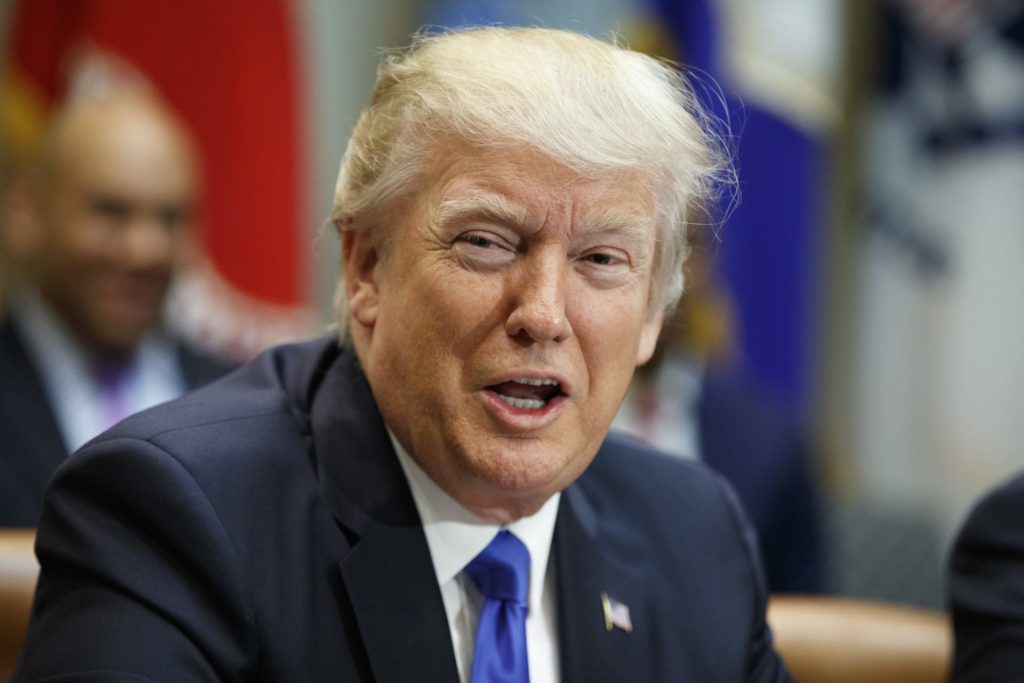
President Donald Trump insisted Thursday that comments by his Supreme Court nominee criticizing his own attacks on the judiciary were “misrepresented,” even as Republican and Democratic lawmakers vouched for the veracity of the remarks. Trump responded after private rebukes from Judge Neil Gorsuch, who said in meetings with lawmakers on Wednesday that the president’s comments about federal judges were “disheartening.” Gorsuch, who was nominated by Trump last week to the nation’s highest court, made the comments in meetings with senators after Trump accused an appeals court panel considering his immigration and refugee executive order of being “so political.” Over the weekend, he labeled a judge who ruled on his executive order a “so-called judge” and referred to the ruling as “ridiculous.” Democratic Sen. Richard Blumenthal of Connecticut first relayed Gorsuch’s remarks on Wednesday following a meeting with him. Trump’s own confirmation team for Gorsuch later confirmed he had made the remarks. But Trump said during a Thursday luncheon with senators that Blumenthal had misrepresented Gorsuch. “His comments were misrepresented. And what you should do is ask Senator Blumenthal about his Vietnam record that didn’t exist after years of saying it did,” he said. Blumenthal, who served in the Marine Corps Reserves during Vietnam, apologized in 2010 for saying he had served in Vietnam. The president made the comments while making the case for Gorsuch during a luncheon with 10 senators, including six of Blumenthal’s fellow Democrats. Blumenthal, a former state attorney general, argued Thursday that Gorsuch would need to go further to publicly denounce Trump’s verbal assault on judicial independence. “He needs to condemn Donald Trump’s attacks publicly and it needs to be much stronger, more explicit and direct than has been done so far,” Blumenthal said. “Unless it is done publicly in a clear condemnation, it will not establish his independence.” Lawmakers from both parties quickly vouched for the veracity of the remarks the senator said Gorsuch made. GOP former Sen. Kelly Ayotte, who is helping with Gorsuch’s confirmation and was at the meeting, issued a statement saying Gorsuch made clear he was not referring to any specific case. But she said the nominee said he finds any criticism of a judge’s integrity and independence to be “disheartening and demoralizing.” Senate Minority Leader Chuck Schumer, D-N.Y., and Sen. Ben Sasse, R-Neb., each confirmed that Gorsuch made the same comments to them. Sasse told MSNBC’s “Morning Joe,” ”Frankly, he got pretty passionate about it.” He added that Gorsuch said any attack on the “‘brothers or sisters of the robe is an attack on all judges’.” Fellow Connecticut Democratic Sen. Chris Murphy came to Blumenthal’s defense Thursday, lashing out in a tweet directed at Trump: “Ha! As a prosecutor, Dick used to put guys like u in jail. Now, u use your position to mock vets, he uses his to make their lives better.” Gorsuch’s comments came at the end of a week of meetings with members of the Senate, which is considering his nomination. His response may have been aimed at drawing a line of separation with the new president. The 9th U.S. Circuit Court of Appeals is weighing the appeal of Trump’s executive order on immigration, which included a temporary travel ban on people from seven Muslim-majority countries. In a hearing Tuesday, judges on the appeals court challenged the administration’s claim that the ban was motivated by terrorism fears, but they also questioned an attorney’s argument that it unconstitutionally targeted Muslims. Trump told visiting police chiefs Wednesday that a portion of the immigration law gives him the power to enact the ban, calling it “beautifully written” and saying, “A bad high school student would understand this.” “Courts seem to be so political and it would be so great for our justice system if they would be able to read a statement and do what’s right,” Trump added. “And that has to do with the security of our country, which is so important.” Since a lower-court judge blocked the order last week, Trump has assailed the decision, leading legal experts, Democrats and some Republicans to question whether his remarks might jeopardize the independence of the judiciary. Others have expressed fears he may be attempting to use political influence to sway the courts. The president has repeatedly said foreigners are “pouring in” since the ban was put on hold and suggested that blocking the order would be dangerous for U.S. citizens. On Wednesday he tweeted, “Big increase in traffic into our country from certain areas, while our people are far more vulnerable, as we wait for what should be EASY D!” The administration has not provided any information to support his claims. Republished with permission of The Associated Press.
Tom Price nears Senate confirmation as Donald Trump health secretary
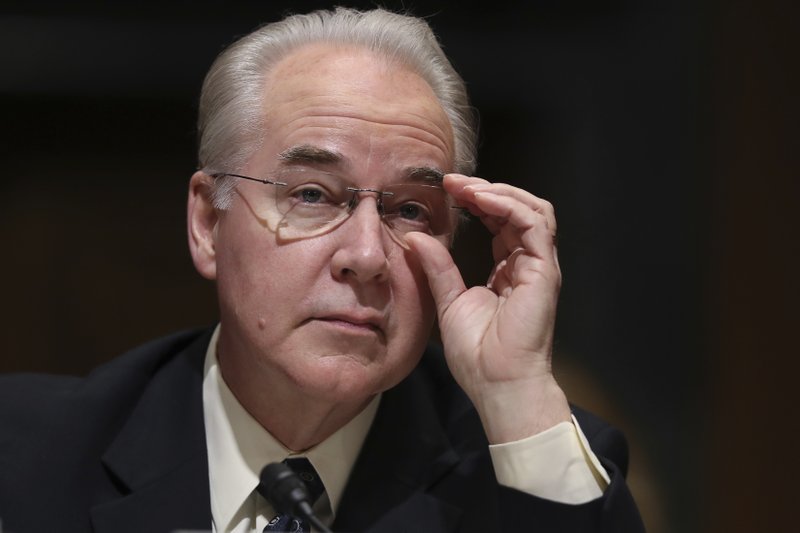
Republicans pushed President Donald Trump‘s pick for health secretary toward Senate confirmation on Thursday, overpowering Democrats who complained that the GOP drive to erase and replace former President Obama’s health care law will end up taking away peoples’ coverage. The debate over the nomination of Rep. Tom Price, R-Ga., to head the Health and Human Services Department was the latest over Trump’s choices, which have prompted near party-line votes and helped fuel a sour atmosphere in the new president’s first weeks. Senate Majority Leader Mitch McConnell, R-Ky., praised Price for knowing “more about health care policy than just about anyone.” He added that the conservative seven-term House member from Atlanta’s suburbs “has a clear-eyed view about Washington’s capacity to do great harm.” Democrats were strongly against Price, a long-time proponent of dismantling Obama’s health care law and reshaping and curbing Medicare and Medicaid. Sen. Sherrod Brown, D-Ohio, said Price’s past support for raising the usual Medicare eligibility age of 65 is “immoral.” And No. 2 Senate Democratic leader Richard Durbin of Illinois said Price’s backing for reshaping Medicare into a voucher-like program would thrust seniors “back into the loving arms of health insurance companies.” Price’s nomination came in a week that has seen Democrats, eager to show liberal constituents that they are taking a stand against Trump, ferociously but unsuccessfully oppose two other nominees for top administration jobs. Over solid Democratic opposition and two GOP defections, it took a tie-breaking vote by Vice President Mike Pence for the Senate to approve wealthy GOP donor Betsy DeVos on Tuesday to head the Education Department. Under the Constitution, one of the duties of a vice president is to break tie votes in the 100-member Senate. On Wednesday, the chamber confirmed Sen. Jeff Sessions, R-Ala., to be attorney general. That debate was bitter, fueled by Democratic accusations that Sessions lacked a devotion to civil rights laws and wouldn’t stand up to Trump. The Sessions battle also saw a rare Senate wrist-slap against one of its own as Republicans late Tuesday pushed through a rebuke of Sen. Elizabeth Warren, D-Mass., for violating the chamber’s rule against impugning a colleague. That came after Warren read on the Senate floor a 1986 letter from Coretta Scott King, Dr. Martin Luther King‘s widow, criticizing Sessions during his rejected judicial nomination 31 years ago. Republicans have talked longingly of confirming Price because one pillar of their strategy to gut Obama’s law is for the Department of Health and Human Services, which he would run, to issue regulations weakening it. Those might include letting states experiment with how they use federal Medicaid funds and restricting access to free birth control for women who work for religious-affiliated nonprofits. At Senate hearings on Price’s nomination, Democrats focused on the former orthopedic surgeon’s considerable stock holdings, especially in health care industry companies. They’ve accused him of conflicts of interest by acquiring those shares, pushing legislation that could benefit those companies and making investments using insider information. Price has said he’s done nothing wrong. It is against the law for members of Congress to engage in insider trading. Democrats have focused on Price’s purchase last year of around 400,000 shares in Innate Immunotherapeutics Ltd., an Australian biotech firm. Price has said he learned of the firm from a colleague, Rep. Chris Collins, R-N.Y., the company’s largest shareholder, and Price testified to Congress that the shares he bought were available to any investor. The company has said Price received a special offer to buy shares at a discount. Price has conceded he understated the value of those stocks in financial disclosure forms he filed. Price also purchased stock last year in Zimmer Biomet, a manufacturer of medical implant devices, around the same time he introduced legislation that would have suspended Medicare rules seen as problematic for such companies. Price has said the purchase was done by his stockbroker. Republished with permission of the Associated Press.
Justice John Roberts, judiciary’s leader, silent on Donald Trump criticism
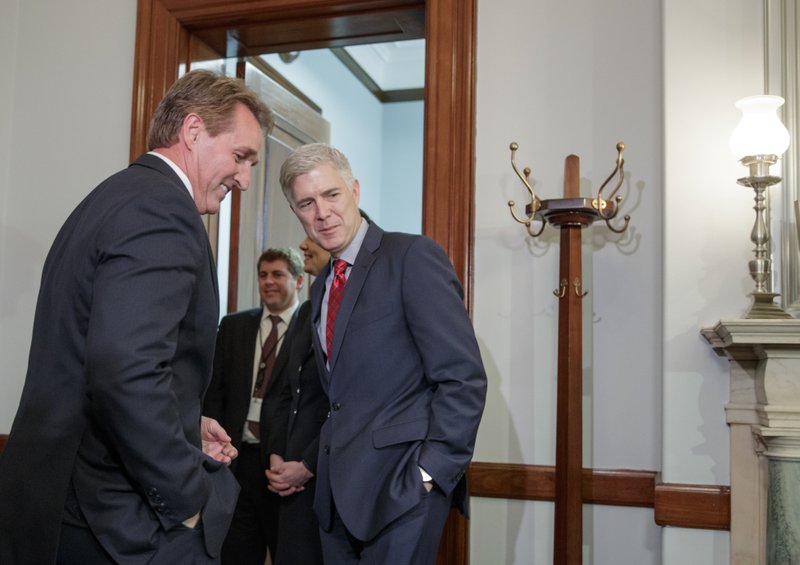
President Donald Trump‘s unusually personal criticism of federal judges has drawn rebukes from many quarters, including from Supreme Court nominee Neil Gorsuch, but not much from the judges themselves. The leader of the federal judiciary, Chief Justice John Roberts, has himself been a target of Trump’s attacks. But Roberts has refused to comment on Trump’s remarks, including recent criticism of judges who are dealing with the president’s executive order on immigration. And that’s not likely to change, even if the tweeter in chief keeps up his attacks on judges. Bolstered by lifetime tenure, independent judges should not respond to criticism, no matter how harsh or that its source is the president, said a former judge, a law school dean and a constitutional law professor. Judges “should basically give the tweets the attention they deserve, which means they should be ignored. This is basically a childish tantrum from someone who didn’t get his way. And the judiciary should go about its business and decide cases, including cases involving him,” said Vanderbilt University law professor Suzanna Sherry. Trump’s style may be different and his language more coarse, but the comments themselves are not the “threat to judicial independence that some commentators have made them out to be,” said University of Pennsylvania law school dean Theodore Ruger. Former U.S. District Judge Paul Cassell said judges would find themselves in unfamiliar territory “if they start critiquing the Twitter feed of the president.” Among sitting judges who have commented in some way is Gorsuch, who has been meeting on Capitol Hill with senators who soon will consider whether to confirm him to the Supreme Court. On Wednesday, Gorsuch said he found the president’s attacks on the judiciary “disheartening” and “demoralizing,” according to Democratic Sen. Richard Blumenthal of Connecticut. Trump took to Twitter to question the veracity of Blumenthal’s account, but Senate Democratic Leader Chuck Schumer of New York and Sen. Ben Sasse, R-Neb., each confirmed that Gorsuch made similar comments to them. Sasse told MSNBC’s “Morning Joe,” ”Frankly, he got pretty passionate about it,” said Sasse, adding that Gorsuch said any attack on the “‘brothers or sisters of the robe is an attack on all judges.’” Former Sen. Kelly Ayotte, a Republican who is helping with Gorsuch’s confirmation and attended the Blumenthal meeting, issued a statement acknowledging that Gorsuch said he finds any criticism of a judge’s integrity and independence to be “disheartening and demoralizing.” But Ayotte said the nominee also made clear he was not referring to any specific comment. Also Wednesday, U.S. District Judge Dan Polster said during a speech in Cleveland that questioning the legitimacy of a federal judge is a line that shouldn’t be crossed. Polster, a nominee of President Bill Clinton, did not mention Trump by name, according to a report on Cleveland.com. Polster said that a public office holder who makes those types of comments “calls into question his or her own legitimacy.” Roberts was the first judge to incur Trump’s wrath. During the presidential campaign last winter, Trump called the chief justice “an absolute disaster” and “disgraceful” mainly for the two opinions Roberts wrote that preserved President Barack Obama‘s health care overhaul. Next in Trump’s sights was U.S. District Judge Gonzalo Curiel, who was presiding over fraud lawsuits against Trump University. In June, Trump called Curiel “a hater of Donald Trump” who couldn’t be fair to him because Curiel is “of Mexican heritage” and Trump had proposed building a wall on the U.S.-Mexican border. Last week, Trump called U.S. District Judge James Robart a “so-called judge” after Robart imposed a temporary halt on Trump’s executive order barring people from seven predominantly Muslim countries from coming to the United States. On Sunday, Trump renewed his Twitter attacks against Robart: “Just cannot believe a judge would put our country in such peril. If something happens blame him and court system. People pouring in. Bad!” On Wednesday, he said the “courts seem to be so political,” in reference to the three federal appeals court judges who are considering the administration’s plea to enforce the order. Trump is not the first president to object to court decisions or to opine about how a court should rule, said Paul Collins, a political science professor at the University of Massachusetts at Amherst. Obama used his 2010 State of the Union message to assail the Supreme Court’s Citizens United campaign finance ruling, with several justices in the audience. Obama also delivered a lengthy pitch for his health care law while the court was weighing the case in 2015. With the exception of John F. Kennedy, every president since Dwight Eisenhower has been critical of some Supreme Court decisions, said Collins, drawing on research he did with co-author Matthew Eshbaugh-Soha of the University of North Texas. But past presidents did not make their displeasure known by “attacking judges … or by questioning the decision such that there’s a possibility of undermining faith in the judicial system,” Collins said. “I get this uncomfortable sense that the president may be trying to lower confidence in judges in anticipation of defying a ruling.” Ruger said Roberts, as the head of the judicial branch of government, or another justice might feel compelled to speak up about the importance of an independent judiciary if the attacks continue. But Cassell, a law professor at the University of Utah who was a judge from 2002 to 2007, said Trump has the right to voice his disagreement. “We live in an age now where, for better or for worse, the language we use is getting rougher in a variety of contexts,” he said. Republished with permission of the Associated Press.
Kevin Glass: The next battlegrounds for school choice: stubborn red states

The sweeping successes of Republicans nationwide in the 2016 elections presents a huge opportunity for the school choice movement. Republicans have historically been more friendly to school choice than Democrats, and they now have 33 governorships and full control of 32 state legislatures. Unfortunately, Republican control doesn’t always equal the best outcomes for students. In places like Texas and Mississippi, hundreds of thousands of students sit on waitlists for choice programs despite Republican control in both of those states. “Mississippi is a little late to the school choice dance,” education activist Kevin Chavrous said, according to Mississippi Watchdog. The state has a choice program, but that “only a small percentage of Mississippi students are able to take advantage, and opportunities need to be expanded.” Reformers there are working with legislators. Watchdog Texas reported that the state “remains a laggard” in this important area, and that the Republican speaker of the house has been an opponent of expansion of school choice programs. The status quo policies are what keep a reported 120,000 students on waitlists to get out of failing public schools. At the very least, education reformers may soon have less opposition from the federal level to their reform efforts. President Trump’s nominee for secretary of education, Betsy DeVos, has been a supporter of choice programs across the country, from charters to education savings accounts to opportunity scholarships. The federal government does not and should not have power over state and local education authorities when it comes to school choice, but it’s still comforting to know that the Department of Education won’t be getting in the way. It’ll be a welcome change from the previous administration, which frequently paired noble goals with questionable tactics. The Obama Department of Education’s school choice policy was frequently paired with strings attached that made many of them unsustainable. The capacity for choice programs has increased in the last few years, but not by nearly enough to keep up with the incredible demand. And, hopefully, a Republican administration will be able to stop the shameful shuttering of choice programs that occurred during the Obama administration. Parents want more choice, as evidenced by the near-record waitlists for choice programs around the country. While there has been progress made in freeing parents and students from ZIP code determinism in recent years, a lot of progress still remains, as evidenced by Texas and Mississippi. A new year after a big election, however, means that opportunities exist nationwide. ••• Kevin Glass is director of outreach and policy at The Franklin Center and was previously managing editor at Townhall.
Robert Bentley names Luther Strange to replace Jeff Sessions

Alabama Gov. Robert Bentley on Thursday named state Attorney General Luther Strange to the U.S. Senate seat left empty by Jeff Sessions. Strange will replace Sessions, whose selection as U.S. attorney general by President Donald Trump was confirmed Wednesday. Strange, a 63-year-old lawyer and former Washington lobbyist, has been the state’s attorney general since 2011. In Strange, Bentley chose a well-connected Republican who last year announced intentions to run for the coveted Senate seat regardless of whether he got the interim appointment. His selection caps two months of jockeying and political guessing games over who would get the nod from Gov. Robert Bentley. ‘‘Alabama has surely been well represented by Senator Sessions, and I am confident Senator Strange will serve as a fine representative for our people. His leadership on a national level, service as a statewide elected official and long record of taking on tough federal issues are the very qualities that will make him a strong conservative Senator for Alabama,’’ Bentley said in a statement. Strange will serve until an election is held to fill the seat for the remainder of Sessions’ term, which ends in January of 2020. Bentley has said that election will be held in the general election in 2018. Strange said he was ‘‘greatly honored and humbled to accept the appointment.’’ ‘‘Senator Sessions’ commitment to public service is nearly unparalleled in Alabama history and his departure from the Senate leaves tremendous shoes to fill. I pledge to the people of Alabama to continue the same level of leadership as Jeff Sessions in consistently fighting to protect and advance the conservative values we all care about,’’ Strange said in a statement. In elevating Strange to the U.S. Senate, Bentley also will have the authority to appoint a state attorney general to fulfill the remainder of Strange’s term. The appointment comes two months after Strange asked an Alabama House committee to pause an impeachment probe of Bentley, who was accused last year of having an affair with a onetime top political adviser. Strange said at the time that his office was doing ‘‘related work’’ though he never publicly elaborated on what it involved or when the work would be completed. Bentley has acknowledged making personal mistakes, but denied doing anything legally wrong. The lawmaker who spearheaded the legislative impeachment, state Rep. Ed Henry, said the appointment of Strange ‘‘looks bad.’’ ‘‘I think Strange looks bad. I think the public perception of that — the appearance of Luther getting it just reeks of conspiracy and collusion. I don’t know if there is, but the appearance is horrible,’’ Henry, a Republican from north Alabama, said Wednesday, a day ahead of the announcement. Henry said he recently apologized to Bentley, not for pushing the impeachment, but for taking pleasure in his personal and legal troubles. As attorney general, Strange served as coordinating counsel for Gulf Coast states in litigation over the 2010 Deepwater Horizon oil spill in the Gulf of Mexico. Under Strange’s direction, Alabama also was one of 25 states that challenged then President Barack Obama’s Clean Power Plan, which aimed to reduce greenhouse gas emissions. And even though he was recused from the investigation, Strange’s office also angered some influential Republicans over a 2016 prosecution of the state’s Republican House speaker at the time. Strange is a graduate of Tulane University, where he played basketball on scholarship, and of Tulane Law school. At 6 foot 9, he is sometimes referred to as ‘‘Big Luther’’ because of his size. Bentley interviewed 20 candidates for the Senate appointment before choosing from among six finalists. Bentley and Strange will hold a news conference Thursday morning. Republished with permission of the Associated Press.
Trump vs Nordstrom: The latest bout raising ethical concerns
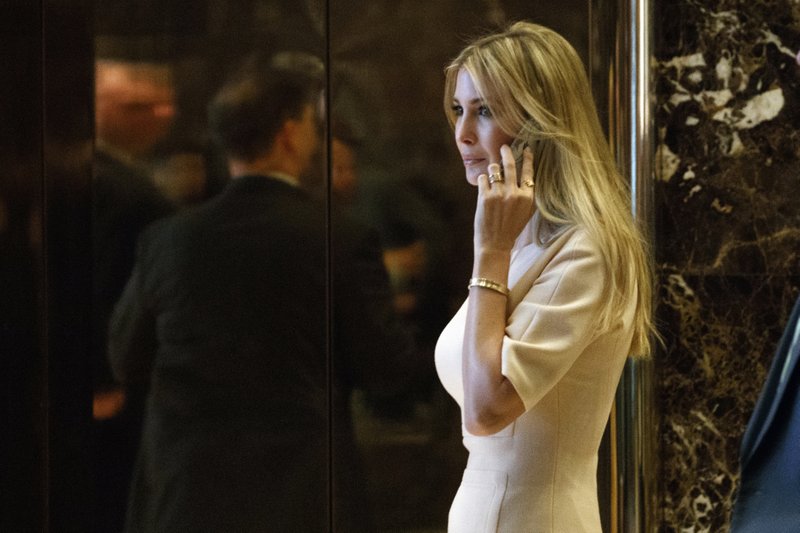
The White House is rushing to the defense of Ivanka Trump‘s company — the latest sign the president can’t seem to separate the presidency from his family’s businesses. President Donald Trump added to a string of presidential firsts on Wednesday, and drew fire from ethics lawyers, with a Twitter attack on Nordstrom. The Seattle-based retailer stoked Trump’s rage by dropping his daughter Ivanka’s clothing and accessory line. The implication, intended or not: Hurt my daughter’s business, and the Oval Office will come after you. “My daughter Ivanka has been treated so unfairly by @Nordstrom,” the president tweeted. “She is a great person — always pushing me to do the right thing! Terrible!” The government-led cheerleading for Ivanka Trump’s private enterprise didn’t end there. White House counselor Kellyanne Conway, in an interview Thursday with Fox News from the White House briefing room, encouraged people to “go buy Ivanka’s stuff.” She boasted that she was giving the brand “a free commercial here.” While Trump himself is not subject to the standards of ethical conduct for federal employees, Conway is. Among the rules: An employee shall not use his or her office “for the endorsement of any product, service or enterprise.” Ivanka Trump does not have a specific role in the White House but moved to Washington with her husband, who is one of Trump’s closest advisers. She followed her father’s approach on business ties by handing over operating control of her fashion company but retaining ownership of it. Though Trump has tweeted about companies such as Boeing, Carrier and General Motors, ethics experts say this time was different. It involved his daughter’s business, which raises conflict-of-interest concerns. White House spokesman Sean Spicer said Trump was responding to an “attack on his daughter” when he posted the tweet and that “he has every right to stand up for his family and applaud their business activities, their success.” The Ivanka Trump flare-up follows revelations that first lady Melania Trump expected to develop “multi-million dollar business relationships” tied to her presence in the White House, according to a lawsuit she filed on Monday. Ethics experts have criticized Trump’s plan to separate himself from his sprawling real estate business by handing managerial control to his two adult sons. The experts want him to sell his company. Most modern presidents have sold their financial holdings and put the cash raised in a blind trust whose investments remained unknown to them. Kathleen Clark, a government ethics expert, said the Nordstrom tweet is problematic because other retailers may think twice now about dropping the Ivanka Trump brand for fear of getting criticized publicly by the president. She said it was especially disturbing that Trump retweeted his message on the official White House account. “The implicit threat was that he will use whatever authority he has to retaliate against Nordstrom, or anyone who crosses his interest,” said Clark, a law professor at Washington University in St. Louis. Clark defended the president’s right to use his personal Twitter account to express his views, however. She noted that government workers recently set up alt-EPA accounts to criticize the president’s policies. “A government employee, even a president, is allowed to tweet in his personal capacity.” One of the president’s fiercest ethics critics, Norman Eisen, described the tweet differently — a “bullying” tactic beneath the dignity of the president’s office. “This is a shot across the bow to everybody who is doing business with Trump or his family,” said Eisen, who was President Barack Obama‘s chief ethics counselor. “It’s warning them: Don’t withdraw their business.” Eisen joined with other legal scholars and lawyers to sue the president last month for allegedly violating a clause in the Constitution that prohibits government officials from accepting gifts or payments from foreign governments. Though other legal scholars disagree, Eisen said such payments include foreign diplomats staying at Trump’s new Washington D.C. hotel and holding events there and at the other Trump venues. Trump and his top aides have repeatedly said that Americans do not care about what Eisen and other ethics critics say. “Prior to the election it was well known that I have interests in properties all over the world,” Trump wrote on Twitter Nov. 21. Two surveys released in January show that’s not entirely the case. A Quinnipiac University poll found that about 60 percent of registered voters were at least somewhat concerned that the president would “veto a law that would be good for the country because it would hurt his business interests.” And a Pew Research Center poll found that 57 percent of American adults were at least somewhat concerned that Trump’s businesses could “conflict with his ability to serve the country’s best interests.” Yet Trump seems to have calculated that his base of supporters forgives — and maybe even encourages — his protective bluster about his family businesses. Nordstrom reiterated Wednesday that its decision was based on the brand’s performance, not politics. The company said sales of Ivanka Trump items had steadily declined over the past year, particularly in the last half of 2016, “to the point where it didn’t make good business sense for us to continue with the line for now.” Retailers drop brands all the time because of poor performance, said brand consultant Allen Adamson. But given a highly charged political environment, perception is reality for loyal Trump fans. “It is clearly hard for Nordstrom to tell the story that it is dropping (the brand) for business reasons,” said Adamson, founder of the firm Brand Simple. Republished with permission of the Associated Press.
Alabama reacts to Luther Strange US Senate appointment
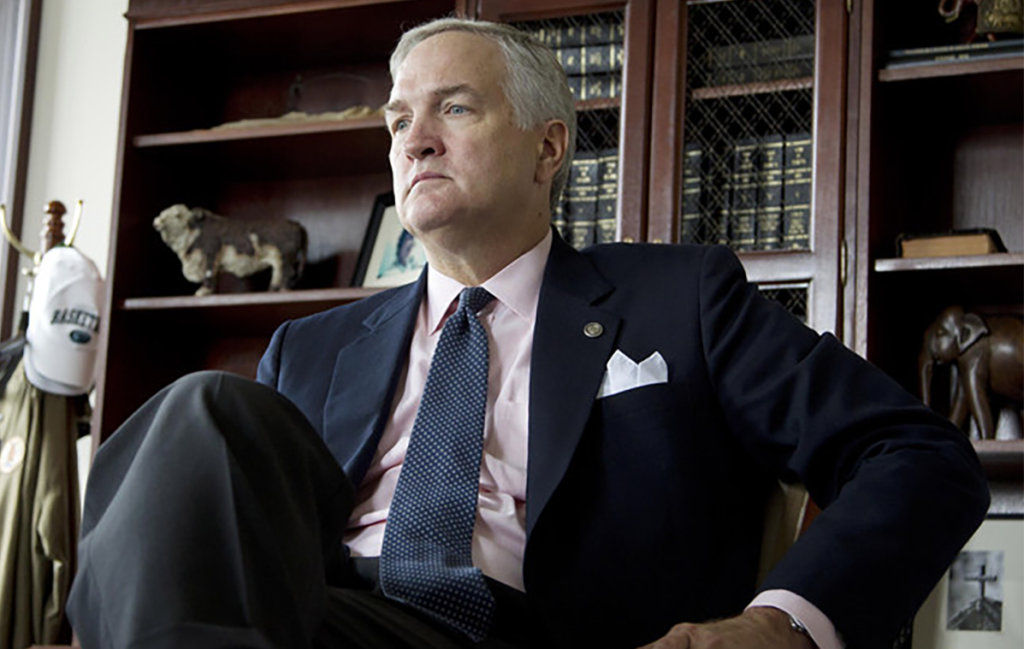
State and federal lawmakers and officials across Alabama are reacting to Governor Robert Bentley‘s Thursday appointment of Alabama Attorney General Luther Strange to replace Jeff Sessions in the U.S. Senate. Here’s what they’re saying: Alabama U.S. Sen. Richard Shelby: The opportunity to serve the people of Alabama is a tremendous honor and privilege, and I am pleased that Governor Bentley took this appointment very seriously. Jeff Sessions leaves behind big shoes to fill in the Senate. I am confident that Luther will step in to this position seamlessly. Luther Strange is known for his unwavering commitment to the Constitution and the rule of law, which will continue to be critical in this new role. I have always known Luther to have the best interest of the state of Alabama in the forefront of his mind, and I look forward to partnering with him to fight for conservative principles in the Senate. Alabama 1st District U.S. Rep. Bradley Byrne: I want to congratulate Luther Strange on his appointment to the United States Senate. I look forward to working with him to advance policies and legislation important to families and small businesses in Southwest Alabama. Alabama has always had a strong and united Congressional delegation, and I look forward to working with Luther to keep that tradition alive. Alabama 2nd District U.S. Rep. Martha Roby: I offer my sincere congratulations to Attorney General Strange on his appointment to the Senate. Alabama’s congressional delegation has a long history of working together to promote our state’s interests – from supporting our significant military footprint to looking out for Alabama farmers. I welcome Luther to the delegation, and I look forward to working with him. Alabama 5th District U.S. Rep. Mo Brooks: I know Luther Strange quite well, having gotten to know him both during campaigns and during his service as Alabama’s Attorney General. I look forward to working with Luther in the U.S. Senate and will do everything I can to help him be the best senator he can possibly be, both because he is my friend and because that is exactly what Alabama and America need at this critical junction in our history. Alabama Republican Party Chairman Terry Lathan: The Alabama Republican Party looks forward to working with our state’s new incoming United States Senator, Luther Strange. General Strange has done a tremendous job serving Alabama as our attorney general. General Strange has a strong record of standing on conservative principles as well as enforcing the laws of our state. We have no doubt he will continue his service to Alabama and our nation with the the highest integrity. It is an exciting time for our country as we have a strong Republican Congress that will work with our new president to Make America Great Again. General Strange will be in good company with Senator Shelby as they represent our state. Potential U.S. Senate appointee Perry O. Hooper Jr.: Last night I spoke with Governor Bentley about the US Senate Appointment. While I was not happy with the result I want to thank the Governor for even considering me for the position. It has been an honor and a privilege. I want to thank God for this opportunity and the many thousands of people that signed petitions, wrote letters and made calls on my behalf to the Governor. The faith you placed in me has really touched my heart and I am forever grateful for your support. I love this state and this country and my commitment to the people of Alabama remains the same. I will do everything I can to support President Trump and his agenda for America and Make America Great Again! Please continue with your prayers for our state, our nation and our leaders so that we may have peace and prosperity for all of our people.
A look at the judges who will rule on Donald Trump’s travel ban
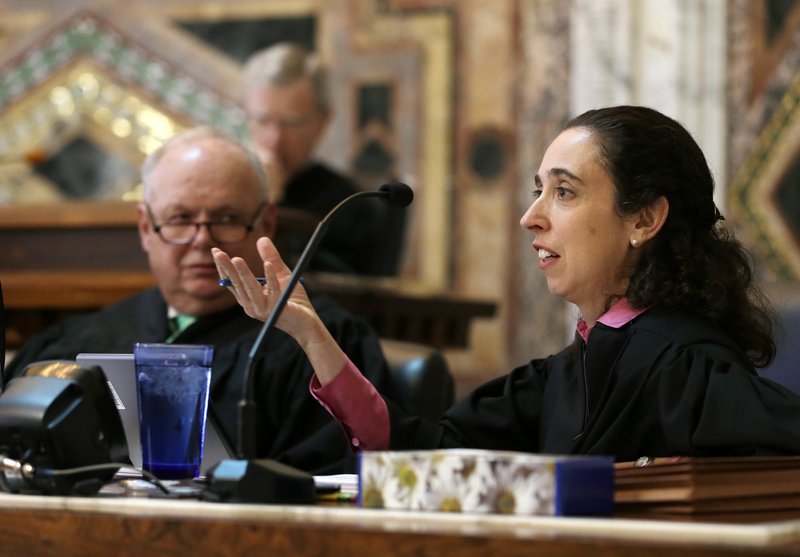
Three judges on the San Francisco-based 9th Circuit Court of Appeals will decide as soon as Thursday whether to immediately reinstate President Donald Trump‘s travel ban, which temporarily suspended the nation’s refugee program and immigration from seven mostly Muslim countries that have raised terrorism concerns. Here’s a look at their backgrounds, judicial decisions and questioning during arguments in the case this week: WILLIAM CANBY Canby rarely hears cases anymore. Now 85, he told The Associated Press two years ago that he felt sharp and healthy, but didn’t want to risk a job hazard that federal judges with lifetime appointments face: age-related mental decline. So it was unusual for the judge to hear oral arguments over the Trump travel ban. Canby — a former U.S. Air Force lieutenant and Peace Corps worker in Africa who was appointed to the 9th Circuit by President Jimmy Carter in 1980 — is known to have a polite and respectful courtroom demeanor. He encourages attorneys to have interests outside the law and told a reporter in 2005 he was running two to three miles before starting his day. He has written extensively about Native American law. Among his more high-profile decisions was a 1988 ruling declaring the U.S. Army’s ban on gay soldiers unconstitutional and a 2000 decision that said the PGA Tour is covered by federal disability law and must provide a cart to golfer Casey Martin. During oral arguments, he challenged the administration’s justification for the ban. Later, Canby appeared to come to the rescue of the attorney challenging the ban when another judge was grilling him about what evidence he had that the travel ban was motivated by anti-Muslim sentiment. Canby asked the attorney who had the legal burden of showing the likelihood of succeeding on their arguments in the case. The attorney responded that that burden was on the administration. ___ RICHARD CLIFTON Clifton, nominated to the 9th Circuit by George W. Bush in 2001, is the second judge from Hawaii to serve on the 9th Circuit. He grew up in the Midwest, but moved to Hawaii to clerk for another 9th Circuit judge after graduating from Yale Law School in 1975. He is still based there. Clifton, 66, was a lawyer for the Hawaii Republican Party, but has described himself as not having a pronounced political philosophy. He handled business and commercial litigation for a prominent Hawaii law firm and had never served as a judge before joining the 9th Circuit. He received nearly unanimous support for his nomination in the U.S. Senate. At his confirmation hearing, California Rep. Christopher Cox described Clifton as a lifelong Chicago Cubs fan, Cub Scout den leader, and dedicated husband and father who had some important credentials for being an appeals court judge: He refereed youth soccer. Since joining the court, Clifton has ruled in favor of a Los Angeles ordinance that required hotel operators to open their guest registries at the demand of police and called for a harsher prison sentence for a terrorist who plotted to blow up Los Angeles International Airport. Of the three judges who heard arguments over the travel ban, Clifton had the toughest questions for the attorney representing the two states — Washington and Minnesota — challenging it. He asked what evidence the attorney had that the president’s travel ban was motivated by religious prejudice. At one point, Clifton pressed him, “Do I have to believe everything you allege and say, ‘Well, that must be right.” But Clifton also grilled the administration’s attorney, asking him whether he denied statements by Trump about banning Muslims. The attorney said he didn’t. ___ MICHELLE FRIEDLAND At 44, Friedland is one of the two youngest federal appeals judges in the country. President Barack Obama appointed her in 2014, and during her confirmation hearing she received support from both parties. Friedland was born in California and attended school in New Jersey, where her father worked as the president of a clothing company and her mother was a writing instructor and freelancer, according to Friedland’s 2000 wedding announcement in The New York Times. She graduated with honors from Stanford University, studied at Oxford University on a Fulbright Scholarship and then got her law degree at Stanford University. She later clerked for U.S. Supreme Court Justice Sandra Day O’Connor. In private practice, she represented major clients, including Berkshire Hathaway, Boeing and the University of California. She was recognized along with a handful of other members of her firm by the California Bar Association for pro-bono work defending the constitutionality of California’s ban on sexual orientation “conversion therapy.” She also represented same-sex couples challenging California’s gay-marriage ban. With less than three years on the appeals court, a full picture of Friedland’s judicial philosophy has yet to emerge, some legal scholars say. Of the three judges at Tuesday’s hearing, she appeared to be the most sympathetic to Washington state’s case, repeatedly questioning the Justice Department’s lawyer over the basis for the travel ban: “Have you offered any evidence to support this need you’re describing for the executive order, or are you really arguing that we can’t even ask about whether there’s evidence because this decision is non-reviewable?” Republished with permission of the Associated Press.
Q&A: Untangling legal issues surrounding Donald Trump’s travel ban
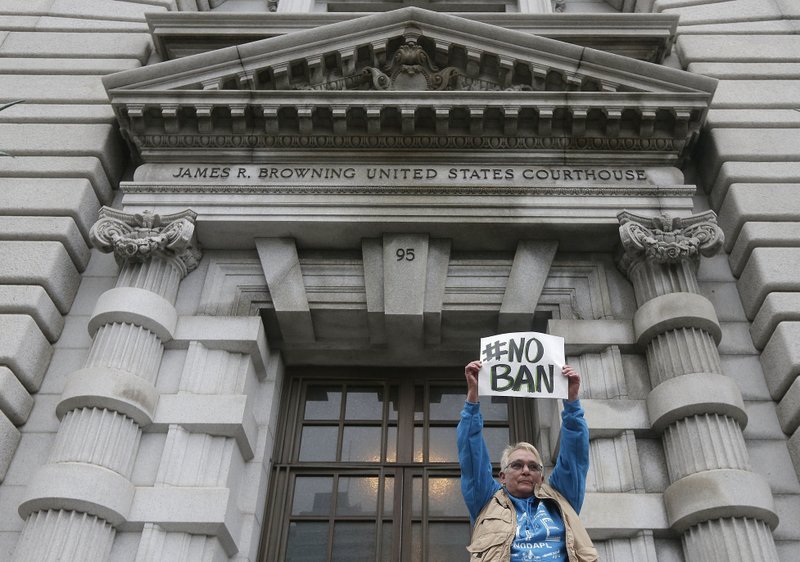
A federal appeals court is considering whether to reinstate President Donald Trump‘s travel ban, but another aspect of his executive order is still in effect — a review of visa procedures to ensure they are strict enough. That review can happen whatever the 9th U.S. Circuit Court of Appeals decides. Knowing that could give the panel of three judges more reason to leave the ban on refugees and people from seven Muslim-majority countries with ties to terrorism on hold while the legal challenge by Washington state and Minnesota plays out. “Is there any reason to think there’s a real risk … if existing procedures weren’t allowed to stay in place while the administration, the new administration, conducts its review?” Judge Richard Clifton asked during a hearing Tuesday. The court said a ruling would come within days but that it would not be Wednesday. ___ WHAT WAS THE UPSHOT OF THE HEARING? Trying to divine how a court might rule from the questioning can be a fool’s errand, but some legal scholars who were willing to try said Washington state appeared to make enough of a case to keep the ban on ice, at least for now. The judges repeatedly asked Justice Department attorney August Flentje whether the government had any evidence that the travel ban was necessary or that keeping it on hold would harm national security. They expressed skepticism over his argument that the states don’t have standing to sue and over his assertion that the courts have little to no role in reviewing the president’s determinations concerning national security. Stephen Vladeck, professor at the University of Texas School of Law, wrote in an email that he was struck by “the government’s seeming inability to provide concrete evidence of why immigration from those countries threatens national security.” Washington state Solicitor General Noah Purcell also faced tough questioning from Clifton, who said he wasn’t necessarily buying the states’ argument that the ban was motivated by religious discrimination. The judge mentioned that the vast majority of Muslims live in countries that aren’t targeted by the ban. ___ MUSLIM DISCRIMINATION OR NOT? After being repeatedly asked, Flentje acknowledged that individuals could have standing to sue if the president tried to enforce a ban on Muslims entering the U.S. But, he said, that’s not all what’s happening here. Basing the order on travel from certain countries that have been linked to terrorism — whatever their religion — is a legitimate exercise of the president’s authority over national security, he argued. Purcell said it’s remarkable to have this much evidence of discriminatory intent this early in the case — including Trump’s campaign statements about a Muslim ban and adviser Rudy Giuliani‘s comments that he was asked to help devise a legal version of the Muslim ban. “There are statements that we’ve quoted in our complaint that are rather shocking evidence of intent to discriminate against Muslims,” Purcell said. Even if Trump’s executive order itself doesn’t single out Muslims, the order is unconstitutionally discriminatory if it was adopted with such intent, Purcell said. ___ WHAT ARE THE COURT’S OPTIONS? Purcell argued that the simplest course is to send the case back to U.S. District Judge James Robart for procedural reasons. The Seattle judge temporarily blocked the executive order last week while the states’ lawsuit works its way through the courts. The Washington state solicitor general said the appeals court could take up the merits of the case after Robart issues a further ruling. The Justice Department said the court could narrow the scope of Robart’s order, which it called too broad. Flentje suggested it could be limited to allow the president to ban travelers who don’t already have relationships with the United States, while allowing legal permanent residents, for example, to return to the U.S. from the seven countries. Purcell said that wouldn’t work. The government hasn’t shown that it could engineer a way to apply the ban so selectively, he said. Judge William Canby noted that Washington’s universities might want to invite foreign scholars to visit and that they might have no connection to the U.S. ___ WILL THE CASE END UP AT THE SUPREME COURT? There’s a good chance, but how and when is unclear. The Supreme Court has a vacancy, and there’s no chance Trump’s nominee, Neil Gorsuch, will be confirmed in time to take part any consideration of the ban. Under the most optimistic timetable, Gorsuch would not be confirmed before early April. Senate Democrats are likely to question Gorsuch about his views on presidential power, both in light of the Trump order and Gorsuch’s writings expressing skepticism about some aspects of executive authority. The travel ban was set to expire in 90 days, meaning it could run its course before the court takes up the issue. Furthermore, the administration could change the executive order, including changing its scope or duration. Republished with permission of the Associated Press.


